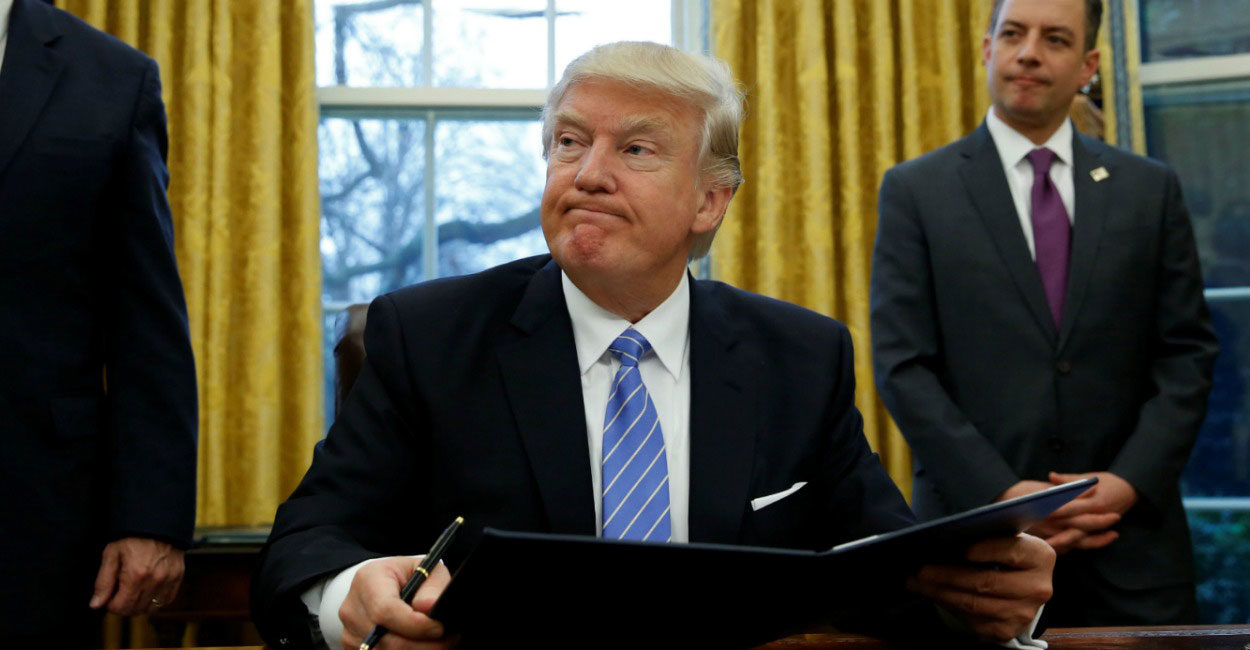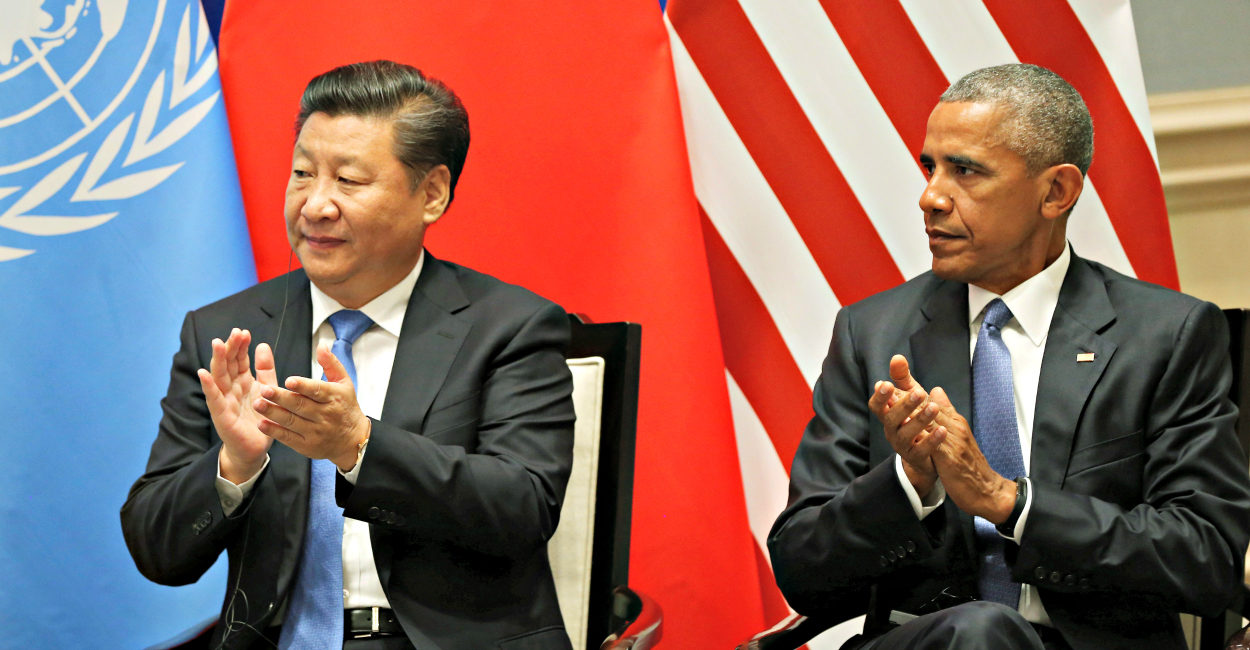Obama’s Mixed Legacy on Immigration
Immigration was the biggest policy issue in the 2016 presidential
campaign, and President Obama’s actions during his eight years in office
are what set the stage.
But Obama’s immigration legacy is a complex one. On the one hand, he is the harshest enforcer of immigration laws in American history, deporting more illegal immigrants than any previous administration. On the other hand, his executive actions have also helped shield from deportation some 750,000 unauthorized immigrants who were brought here as children.
What lessons can we draw from Obama’s mixed legacy on immigration?
But Obama’s immigration legacy is a complex one. On the one hand, he is the harshest enforcer of immigration laws in American history, deporting more illegal immigrants than any previous administration. On the other hand, his executive actions have also helped shield from deportation some 750,000 unauthorized immigrants who were brought here as children.
What lessons can we draw from Obama’s mixed legacy on immigration?
Why President Trump’s Executive Order on Syrian Refugees Is Wrong
In environmental policy, the precautionary principle states that a
new product, method, or proposal whose effects are disputed or unknown
should not be introduced if it is harmful. The burden of proving that it
is harmless falls on its backers—virtually guaranteeing that it won’t
be produced. In contrast, a cost-benefit analysis that compares the
probability of harm with the expected magnitude of the benefits is a
better method.
Workers of the World Do Best in Free Markets
By Daniel J. Mitchell
It’s time to channel the wisdom of
Frederic Bastiat. There are many well-meaning people who understandably
want to help workers by protecting them from bad outcomes such as pay
reductions, layoffs and discrimination.
My normal response is to remind them that the best thing for workers is a vibrant and growing economy. That’s the kind of environment that produces tight labor markets and more investment, both of which then lead to higher pay.
My normal response is to remind them that the best thing for workers is a vibrant and growing economy. That’s the kind of environment that produces tight labor markets and more investment, both of which then lead to higher pay.
Trump’s Import Taxes Could Devastate US Economy
Give President-elect Trump credit for consistency. In his selections
of Wilbur Ross as commerce secretary, Peter Navarro as chairman of the
National Trade Council, and Robert Lighthizer as U.S. trade
representative, Trump has empowered a protectionist triumvirate to
deliver on his provocative campaign promises.
Among the various ahistorical ideas under consideration is an across-the-board tariff of 10 percent on all imports. Exactly what the intended purpose of such a tax would be remains unclear — To achieve trade balance by reducing imports? To dissuade U.S. companies from outsourcing? To encourage foreign companies to invest in the United States? To show the world who’s boss?
Insanity may be too mild a diagnosis.
Among the various ahistorical ideas under consideration is an across-the-board tariff of 10 percent on all imports. Exactly what the intended purpose of such a tax would be remains unclear — To achieve trade balance by reducing imports? To dissuade U.S. companies from outsourcing? To encourage foreign companies to invest in the United States? To show the world who’s boss?
Insanity may be too mild a diagnosis.
The Case for Currency Substitution in Venezuela
Venezuela lopped off three zeros when it replaced its old currency in January 2008. The arrival of new banknotes on December 18 shows
the government is committed to putting those zeros back on. The newest
denomination, 500 bolívares, will soon be joined by 1,000, 2,000, 5,000,
10,000, and 20,000 bolívares notes. Higher denominations are supposed
to help Venezuelans deal with rising prices. But it isn’t new notes that
hard-working Venezuelans need; it’s a new money.
School Choice Means Accountability to Parents
We all want an education system that delivers a high-quality
education to all children. Ensuring quality requires holding schools
accountable for results, but that raises a crucial question: accountable
to whom?
A few years ago, as the Arizona Legislature was considering expanding its pioneering education savings account (ESA) program, the mother of a child with special needs who benefited from an ESA listened in disbelief as critics described the program as “unaccountable.”
A few years ago, as the Arizona Legislature was considering expanding its pioneering education savings account (ESA) program, the mother of a child with special needs who benefited from an ESA listened in disbelief as critics described the program as “unaccountable.”
How to Make ‘America First’ Truly Great
By Doug Bandow
Only Donald Trump would attempt to rescue the phrase “America First”
from its slightly discreditable heritage. Unfortunately, his sales job
has been incomplete and unconvincing. Now, someone needs to rescue the
same phrase from his crabbed, negative meaning.
The dominant foreign-policy vision animating left and right in recent years has been promiscuous intervention. While elites disagreed on tactics and targets, both major political parties shared a belief that Washington, DC should micromanage the world. God knows when a single sparrow falls to earth, Jesus declared, and so does Uncle Sam. United States presidents are apt to act if a company loses money, an election is stolen, a stock market collapses, a civil disturbance occurs, an aggression is launched, a threat is made, a weapon is tested, or an American value is disregarded.
The dominant foreign-policy vision animating left and right in recent years has been promiscuous intervention. While elites disagreed on tactics and targets, both major political parties shared a belief that Washington, DC should micromanage the world. God knows when a single sparrow falls to earth, Jesus declared, and so does Uncle Sam. United States presidents are apt to act if a company loses money, an election is stolen, a stock market collapses, a civil disturbance occurs, an aggression is launched, a threat is made, a weapon is tested, or an American value is disregarded.
The Tug of War on ISIS inside Donald Trump’s Head: Does He Escalate or Avoid What Is Likely to Be a Counterproductive War?
Now in office, it’s time for President Trump to deliver on his
campaign promises. A critical one will be his promise to destroy the
Islamic State. CNN recently reported that the Pentagon has already
developed a set of options for Trump to review, purportedly including
significantly increased American military forces and the deployment of
thousands of ground troops.
The question is: What plan of attack is likely to appeal most to Trump? As the President evaluates the options, his operating style and his worldview will pull him in distinctly different directions.
The question is: What plan of attack is likely to appeal most to Trump? As the President evaluates the options, his operating style and his worldview will pull him in distinctly different directions.
Divining the Emerging Trump Doctrine
Donald Trump has now officially taken over the reins of American
foreign policy, after having done so less officially (mostly via
Twitter) during the transition. Prediction is a dangerous game, and, as
many observers have noted, Trump’s comments on foreign policy have been
anything but consistent thus far.
Even so, I think we can discern the broad outlines of an emerging Trump Doctrine. Three key themes, in particular, will shape Trump’s decision-making on foreign policy.
The most fundamental pillar of the doctrine is Trump’s “America First” nationalism. It is a rejection of the idea that the U.S. is obligated to worry about the rest of the world.
Even so, I think we can discern the broad outlines of an emerging Trump Doctrine. Three key themes, in particular, will shape Trump’s decision-making on foreign policy.
The most fundamental pillar of the doctrine is Trump’s “America First” nationalism. It is a rejection of the idea that the U.S. is obligated to worry about the rest of the world.
Trump’s Immigration Ban Is Illegal
President Trump signed an executive order on Friday that purports to bar for at least 90 days almost all permanent immigration from seven majority-Muslim countries, including Syria and Iraq, and asserts the power to extend the ban indefinitely.
But the order is illegal. More than 50 years ago, Congress outlawed such discrimination against immigrants based on national origin.
Sunday, January 29, 2017
How Arthur Laffer Would End Trade Warfare
The creator of the Laffer curve now wants a “curb” on currency manipulation. His three-question test for countries.

Economist Arthur Laffer was on Capitol Hill
last week pitching the “Laffer Curb.” It’s a strategy aimed at
preventing our trading partners from engaging in currency manipulation,
which arguably has cost the U.S. many millions of jobs.
Laffer,
74, is best remembered for the “Laffer Curve,” which he scribbled on a
napkin in 1974 to illustrate the negative effect of high tax rates on
government revenues. If you hike taxes beyond a certain rate—a sweet
spot, so to speak—then you end up collecting less revenue, he argued.
President Gerald Ford was about to raise taxes at the time and Laffer,
then 34, was trying to explain to Ford aides Dick Cheney and Donald
Rumsfeld that high taxes cause people to opt for leisure over labor.
The Truth about the Trade Deficit

This
election cycle the issue of the trade deficit has been a topic of great
debate, with front-running candidates suggesting that the deficit is an
example of how the U.S. is losing or being “ripped off’ economically.
As of February this year, the balance in trade of goods and services
stands at $47.1 billion.
While this isn’t the largest trade deficit in recent years, some
academics and politicians continue attempting to draw a relationship
between the trade deficit and job losses.
According to the Economic Policy Institute, the trade deficit with the 11 Trans-Pacific Partnership (TPP) economies cost 1,057,200 manufacturing jobs in 2015. Overall, EPI claims that the trade deficit resulted in a total of 2 million job losses last year.
According to the Economic Policy Institute, the trade deficit with the 11 Trans-Pacific Partnership (TPP) economies cost 1,057,200 manufacturing jobs in 2015. Overall, EPI claims that the trade deficit resulted in a total of 2 million job losses last year.
Saturday, January 28, 2017
Trump Reinstates Policy Protecting Taxpayer Dollars From International Abortion Activity
Melanie Israel /

President Donald Trump looks up while signing an
executive order reinstating the Mexico City policy, Jan. 23, 2017.
(Photo: Kevin Lamarque/Reuters/Newscom)
In one of his first official actions, President Donald Trump reinstated
the life-affirming Mexico City policy, ensuring that American taxpayers
do not fund international organizations that perform or promote
abortion overseas.
The news comes just after the 44th anniversary of Roe v. Wade, which legalized abortion on demand across the country.
The news comes just after the 44th anniversary of Roe v. Wade, which legalized abortion on demand across the country.
Congress Should Learn From Obama’s Last-Minute UN Spending Binge
Brett Schaefer /

In September 2016, President Barack Obama and
Chinese President Xi Jinping approve of remarks by U.N. Secretary
General Ban Ki-moon during a joint ratification of the Paris climate
change agreement in Hangzhou, China. (Photo: How Hwee
Young/Reuters/Newscom)
During President Barack Obama’s final days in office,
administration officials ran through over $700 million in a spending
binge designed to fund U.N.-related priorities that lacked support in
the Republican-controlled Congress and, likely, the incoming Trump
administration.
How Government Planning Holds Back Our Greatest Potential
Anthony Esolen /

Western civilization needs a renewal that must emerge from the private spheres of life. (Photo: iStock Photos)
That is a little over a hundred miles, but along the rails you will see miles and miles of dilapidation and defacement—culverts scrawled with gangland graffiti and obscenities, the undersides of bridges heaped up with garbage, old fences rotting and falling apart, abandoned mills, disused stations, remains of telephone lines—all looking like something left over after wartime, except that in our case the war has been waged culturally, the damage done to family life and to the men who in other times might have kept such places from reverting to rot and filth.
The Tug of War on ISIS inside Donald Trump’s Head: Does He Escalate or Avoid What Is Likely to Be a Counterproductive War?
Now in office, it’s time for President Trump to deliver on his
campaign promises. A critical one will be his promise to destroy the
Islamic State. CNN recently reported that the Pentagon has already
developed a set of options for Trump to review, purportedly including
significantly increased American military forces and the deployment of
thousands of ground troops.
The question is: What plan of attack is likely to appeal most to Trump? As the President evaluates the options, his operating style and his worldview will pull him in distinctly different directions.
The question is: What plan of attack is likely to appeal most to Trump? As the President evaluates the options, his operating style and his worldview will pull him in distinctly different directions.
Divining the Emerging Trump Doctrine
Donald Trump has now officially taken over the reins of American
foreign policy, after having done so less officially (mostly via
Twitter) during the transition. Prediction is a dangerous game, and, as
many observers have noted, Trump’s comments on foreign policy have been
anything but consistent thus far.
Even so, I think we can discern the broad outlines of an emerging Trump Doctrine. Three key themes, in particular, will shape Trump’s decision-making on foreign policy.
Even so, I think we can discern the broad outlines of an emerging Trump Doctrine. Three key themes, in particular, will shape Trump’s decision-making on foreign policy.
Trump’s Immigration Ban Is Illegal
President Trump signed an executive order on Friday that purports
to bar for at least 90 days almost all permanent immigration from seven
majority-Muslim countries, including Syria and Iraq, and asserts the
power to extend the ban indefinitely.
But the order is illegal. More than 50 years ago, Congress outlawed such discrimination against immigrants based on national origin.
That decision came after a long and shameful history in this country of barring immigrants based on where they came from. Starting in the late 19th century, laws excluded all Chinese, almost all Japanese, then all Asians in the so-called Asiatic Barred Zone. Finally, in 1924, Congress created a comprehensive “national-origins system,” skewing immigration quotas to benefit Western Europeans and to exclude most Eastern Europeans, almost all Asians, and Africans.
But the order is illegal. More than 50 years ago, Congress outlawed such discrimination against immigrants based on national origin.
That decision came after a long and shameful history in this country of barring immigrants based on where they came from. Starting in the late 19th century, laws excluded all Chinese, almost all Japanese, then all Asians in the so-called Asiatic Barred Zone. Finally, in 1924, Congress created a comprehensive “national-origins system,” skewing immigration quotas to benefit Western Europeans and to exclude most Eastern Europeans, almost all Asians, and Africans.
No comments:
Post a Comment